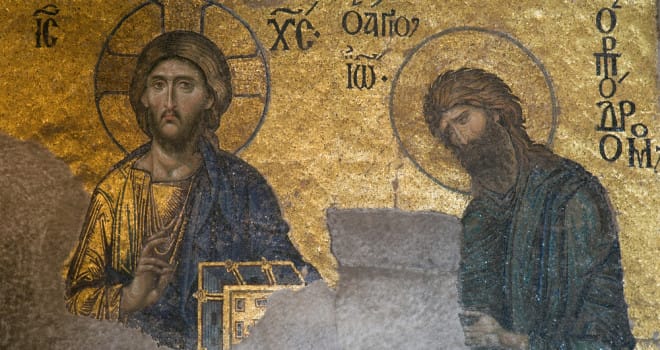Regrettably, my wife Jenica did the vast majority of our wedding planning on her own. It’s no surprise that my failure to offer a help was a source of conflict on several occasions. For example, one evening, while Jenica was making wedding invitations, I looked up from my computer to realize that she was gone. Distracted, I hadn’t noticed her leave the room. Often when Jen’s upset she wisely disappears to cool-off before evaluating the situation. So when I realized that I was alone with a mountain of unfinished invitations, I knew something was amiss.
The feeling I had at that moment is something I think we’ve all experienced. It’s the moment we realize that we’ve let down those we depend on. Jen expected my help. It was our wedding after all and weddings take at least two people, not counting all the support contributed by family and friends. Repentance, I want to argue, is the realization that we don’t do life on our own. We depend on a power greater than ourselves — friends, family, neighbors, government, water, soil, oxygen and in these God.
I say this change was invisible because it was taking place in my heart, a realm that doesn’t appear and can’t be shared. A change in behavior is observable and it may correspond to a movement in one’s heart, but it can’t guarantee it. Similarly, lying is easy and sometimes we’re tempted to act the right way for the wrong reasons. The point is, one can never guarantee what occurs in the heart; it’s a matter of faith. It is precisely in this invisible realm that the Holy Spirit is at work. The author of Isaiah (a passage John the Baptist refers to in our passage from Matthew) writes,
A shoot will come up from the stump of Jesse;
from his roots a Branch will bear fruit.
2 The Spirit of the Lord will rest on him--
the Spirit of wisdom and of understanding,
the Spirit of counsel and of might,
the Spirit of the knowledge and fear of the Lord--
3 and he will delight in the fear of the Lord.
He will not judge by what he sees with his eyes,
or decide by what he hears with his ears;
4 but with righteousness he will judge the needy,
with justice he will give decisions for the poor of the earth. (Isaiah 11:1-4a)
The above passage speaks both to the way the Spirit is part of the process of judging the situation and how it’s part of the invisible realm that we often refer to as one’s heart. Only God can judge what cannot be seen or heard, and only God can judge the movement of the heart. Although invisible, the Holy Spirit is at work in the process of judgment as we begin to own our responsibilities to others.
Although invisible, the work of the Holy Spirit can be recognized by its fruits. In my case, the fruit was evident in the fact that the invitations were completed. In other words, evidence of the Holy Spirit is found as the change that occurs in one’s heart is expressed in tangible ways even if these fruits can never guarantee that change has occurred. This change I want to argue is related to the third thing John talks about — fire. The fire, John tells us, consumes the old. A fire didn’t literally destroy our relationship; however, after repentance and judgment, the old way of doing things began to change until it was completely burned by the new. I stopped being lazy and started helping Jenica plan the wedding.
To summarize the three movements: Repentance is the recognition that life isn’t the result of a single individual. Life springs out of relationship. Once we make this observation we need to work at understanding our responsibility to others. Owning our responsibility is the realm of the Spirit. And finally, as we begin to learn how to relate to one another our lives are transformed, the old is consumed by the new — a movement symbolized by fire.
Beyond the symbolism of baptism, there are other hints in the text that Matthew is thinking along similar lines as what’s been discussed in the example above. For instance, as John is baptizing in the Jordan river, he notices an approaching group of Pharisees and Sadducees and says to them,
“You brood of vipers! Who warned you to flee from the coming wrath? 8 Produce fruit in keeping with repentance. 9 And do not think you can say to yourselves, ‘We have Abraham as our father.’ I tell you that out of these stones God can raise up children for Abraham. 10 The ax is already at the root of the trees, and every tree that does not produce good fruit will be cut down and thrown into the fire.
John immediately points to the brokenness in his society. The leaders of Israel don’t understand that transformation is necessary. The leaders see themselves as inherently blessed due to being children of Abraham and for this reason they don’t need to spend time considering how their actions are harming the people of Israel. Their entitlement obscures their need to take John’s judgement to heart. It’s kind of like if I recognized that something was wrong when Jenica was upset but told her that it was her fault not mine because I’m a man and men don’t help plan weddings. Such idiocy would cause my world to crumble. The leaders of Israel believed similar things about themselves and as John warns, “the ax [was] already at the root of the trees.”
See, what I failed to explain earlier is that transformation is inevitable. You can be transformed through the fire of reconciliation, peace, and forgiveness, or you can be transformed through the fire of violence. Either way, you cannot extinguish the fire. John, like Christ, warns the leaders of Israel hoping they will choose reconciliation.
Matthew isn’t finished, however, although John warns the leaders of Israel of a coming baptism, he is about to experience his own kind of baptism. After giving his warning, John continues saying,
11 “I baptize you with water for repentance. But after me comes one who is more powerful than I, whose sandals I am not worthy to carry. He will baptize you with the Holy Spirit and fire. 12 His winnowing fork is in his hand, and he will clear his threshing floor, gathering his wheat into the barn and burning up the chaff with unquenchable fire.”
John accompanies his warning with an explanation that follows a similar pattern: he speaks of repentance, judgment, and fire. However, there are two primary differences in his explanation. First, rather than talking about the hearts of the religious leaders, he reveals something about the condition of his own heart — he believes he is unworthy. Second, he talks of the transformation as the work of both the Holy Spirit and the fire revealed in Christ.
I want to end by considering John’s transformation and how it, like his warning to the religious leaders, reveals the work of the Spirit.
John’s heart is the flipside of the Pharisee’s heart. The Pharisees saw themselves as inherently worthy, and so there was no need to be transformed by the world and people around them. They believed that their voice and actions were the only ones that mattered. John sees himself as inherently unworthy. He believes that his actions are of little consequence and, in this sense, he is incapable of participating in transformation. In other words, the Pharisees don’t need to carry Christ’s sandals because they’re already perfect, and John can’t carry Christ’s sandals because he’s imperfect. Either way, no one is carrying Christ’s sandals, and in this sense, John and the Pharisees are the same. In the end, the religious leaders continue on their violent path and are thrown into a garbage dump where they literally burn. John, as we will see, desires a different kind of fire.
After John reveals his attitude of unworthiness, Jesus appears at the Jordan river. And although the NIV titles this section “Christ’s Baptism,” it could just as easily be called “John’s Baptism.”
13 Then Jesus came from Galilee to the Jordan to be baptized by John.14 But John tried to deter him, saying, “I need to be baptized by you, and do you come to me?”
15 Jesus replied, “Let it be so now; it is proper for us to do this to fulfill all righteousness.” Then John consented.
Christ’s actions judge John, revealing that he is more than worthy of carrying Christ’s sandals, in fact, Christ has come to him to be baptized. Initially, John is faithful to his unworthy heart, responding in disbelief. But Christ asks John to take ownership of their life together. John consents; his heart is moved as he recognizes that Christ needs him just as he needs Christ. Through his relationship with Christ, John is baptized by the Holy Spirit.
We repent recognizing that life depends on others and through the judgment of the Holy Spirit we take ownership of our life together. Life flourishes when we choose reconciliation. As the prophet of Isaiah writes, “prepare the way of the Lord, make straight the ways of his kingdom of peace.”
*The title of this post was inspired by Nadia Bolz Weber’s recent article on the same passage in Matthew on Patheos.
Caleb Ratzlaff attends Westview Christian Fellowship in St. Catharines Ontario and is a member of Westview Centre 4 Women’s board of directors. He spends the majority of each day raising two toddlers. And when he’s not chasing his boys around the neighborhood, he might be blogging at calebratzlaff.wordpress.com.


 RSS Feed
RSS Feed

